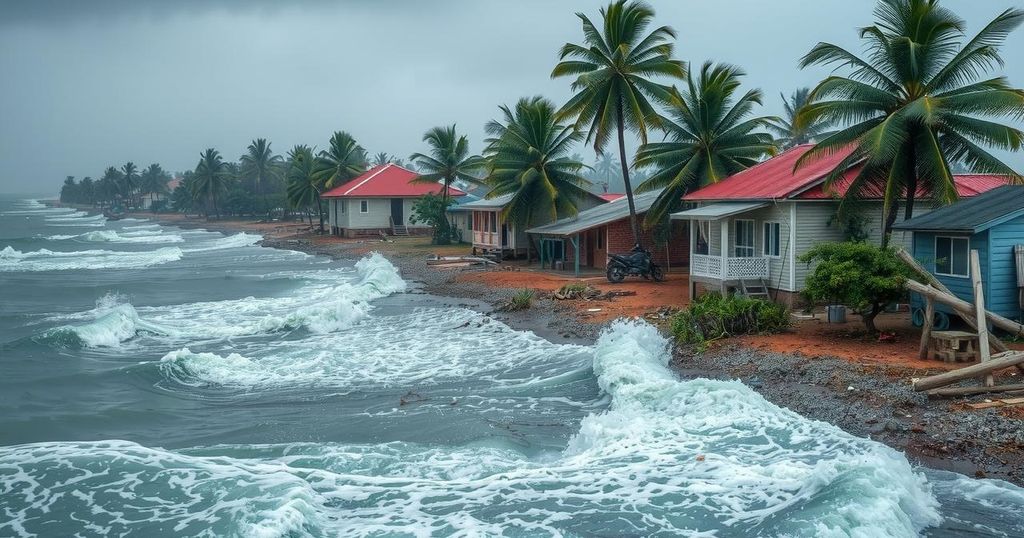Cyclone Chido Devastates Mozambique and Mayotte: A Summary of the Disaster’s Impact
Cyclone Chido has claimed 94 lives in Mozambique, leaving over 622,000 individuals affected and 768 injured. The cyclone, which struck on December 15, caused extensive damage to schools and health facilities. Efforts are underway by the government to support recovery in impacted provinces. Mayotte also faced severe devastation, with 35 confirmed deaths and warnings of a significantly higher toll as assessments continue.
Cyclone Chido has tragically resulted in the deaths of 94 individuals in Mozambique since making landfall on December 15th. The National Institute of Risk and Disaster Management (INGD) reported that 768 individuals sustained injuries, while over 622,000 people have been affected by the disaster in some manner. With wind speeds reaching 260 km/h and significant rainfall of 250mm within the first 24 hours, Chido initially hit the French territory of Mayotte before progressing to Mozambique, Malawi, and Zimbabwe.
In Mozambique, the cyclone primarily affected the northern provinces, notably Cabo Delgado, Niassa, and Nampula. The INGD also noted extensive damage to the education and health sectors, impacting over 109,793 students and damaging 52 medical facilities, which jeopardizes access to crucial health services amidst already limited healthcare in some regions. Daniel Chapo, leader of Mozambique’s ruling party, emphasized the government’s efforts to mobilize support across all levels. He stated that collaboration with the INGD is ongoing to assist the provinces hardest hit, including Mecúfi, Nampula, Memba, and Niassa.
Chido notably left a devastating impact in Mayotte, where it has been recorded as the most severe storm to affect the archipelago in nearly a century, resulting in the confirmed deaths of 35 individuals. Authorities have cautioned that this figure may rise significantly as assessments continue, with warnings that the death toll might ultimately reach several hundreds or even thousands. In response to the disaster, over 1,300 officers have been deployed to assist the local population, although many residents are still without basic necessities one week post-cyclone. The Ministry of Interior has recommended boiling water prior to consumption as water supply gradually returns in the capital of Mayotte.
The response has included substantial daily deliveries of equipment, with an air bridge established to transport supplies between Mayotte, Reunion, and mainland France. As stated by Interior Minister Bruno Retailleau, “80 tonnes of food and 50 tonnes of water had been distributed across Mayotte that day.”
Tropical cyclones, typified by extreme winds, heavy rainfall, and storm surges, frequently lead to widespread destruction and flooding. The INGD has indicated that Cyclone Chido highlights the precariousness of social infrastructure in the face of climate change and underscores the urgency for resilient planning to mitigate future disasters. Although assessing the direct impacts of climate change on specific tropical cyclones can be complicated, there is strong evidence presented by the UN’s climate body, the IPCC, confirming that human activity contributes to increased precipitation and the likelihood of more intense cyclones.
The recent devastation caused by Cyclone Chido underscores the increasing frequency and intensity of tropical cyclones linked to climate change. Tropical cyclones are characterized by high wind speeds, heavy rainfall, and storm surges, which cause extensive damage and flooding in affected regions. The impact on infrastructure, particularly in vulnerable areas, emphasizes the need for improved disaster preparedness and resilience planning. As evidenced by Cyclone Chido’s destructive path from Mayotte to Mozambique, the repercussions of such natural disasters can lead to tragic loss of life and significant disruption to essential services.
In conclusion, the impact of Cyclone Chido has resulted in significant loss of life and widespread damage across Mozambique and Mayotte, highlighting the urgent need for enhanced disaster response and climate resilience strategies. The government of Mozambique is actively mobilizing support to assist affected regions, while the situation in Mayotte remains critical as assessments of the damage continue. This cyclone serves as a stark reminder of the vulnerabilities faced by communities in the face of climate change and the necessity for ongoing efforts to mitigate such disasters in the future.
Original Source: www.bbc.com




Post Comment